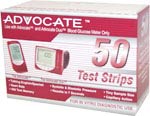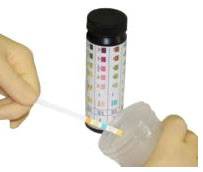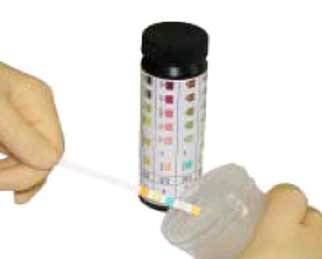Home » Home Health Care Products & Supplies » Knowing Your Diabetic Testing Supplies & Tools » Knowing Your Diabetic Testing Supplies & Tools
Knowing Your Diabetic Testing Supplies & Tools

Advocate Blood Glucose Test Strips, Box of 50
Retail Price: $29.00
Your Price: $24.00
 Unit: 1 box
Unit: 1 box

10 Parameter Urine Reagent Strips Test
Retail Price: $502.74
Your Price: $426.99
 Unit: 12/case
Unit: 12/case

Urine Reagent Strips for Ketone
Retail Price: $132.30
Your Price: $103.29
 Unit: 12/case
Unit: 12/case
Blood glucose levels for diabetic individuals can change dramatically depending on quantity and types of food eaten, time of the day, hormone levels and exercise. A diabetic who does not monitor blood glucose levels closely and maintain the proper levels can ultimately cause damage to the eyes, nerves, kidneys, feet, heart and blood vessels. Diabetic glucometers provide an accurate measure of blood sugar and store that information for your physician and diabetes care team to analyze to direct your medical care program.
Diabetic care decisions are based on your blood glucose level readings and must be accurate for your physician and diabetes care team to design the best care possible.
For diabetic individuals, the glucometer is their most important piece of diabetic equipment. The diabetic glucometer provides a more accurate reading of blood sugar levels than visually matching test strips to a color chart.
It is important for diabetic individuals and their care team to learn about the specific glucometer selected, including accuracy testing, calibration and type of test strips. To maintain accurate readings, diabetic patients should make certain their glucometers are not stored in extreme temperatures, kept clean, calibrated to the specific lot of test strips and maintained according to manufacturer recommendations.
Many glucometers can download testing results directly to your physician’s computer for analysis, saving time for you and your physician. If this is the route you prefer, be sure that the diabetic glucometer is compatible with your physician’s computer and software systems. You should also maintain a hard copy backup log of blood glucose readings.
Diabetic Lancets and Test Strips:
Diabetic lancets are used to stick the finger producing a drop of blood for testing blood glucose levels. Lancets have several lengths of needles, depending on your skin and blood circulation. Short lancet lengths are recommended for children and older diabetics who may have thin skin without much fatty tissue. Longer lengths are recommended for diabetics with tough or calloused skin or those with poor circulation. You may want to keep several lengths in stock, since temperature changes can affect blood flow. Automatic lancet devices usually have several depth settings and may have adjustable tips. Some lancet devices use suction to draw blood to the surface, allowing diabetic patients to use sites other than sensitive fingertips.
Test strips have been designed to aid diabetics in blood collection and analysis. They are easy to handle, individually wrapped and come with visual comparison color charts. Some have a capillary effect that draws blood to the test spot. Diabetic individuals should adhere to diabetic test strip expiration dates and not store them in extreme temperatures.
Diabetic Urine Test Strips, Tapes and Tablets:
Urine testing is used to detect keytone levels. If a diabetic individual’s urine tests positive for keytones, it indicates that the blood glucose level is out of control. Keytones in the urine indicates that the diabetic patient’s body is burning fat instead of glucose for energy and generally occurs when the blood glucose level is consistently high. It is important for diabetic patients to avoid taking a large dose of vitamin C prior to testing and to avoid placing strips, tapes or tablets on counters recently cleaned with bleach. You should be aware that diabetic urine testing products are light-sensitive, temperature-sensitive, moisture-sensitive and should not be used past expiration dates.
Diabetic carrying cases help diabetics organize and protect diabetes management supplies and equipment used several times a day. Diabetics who use insulin injections to control diabetes must carry insulin bottles, syringes, lancets and test strips, alcohol swabs, glucometer and diabetic reaction treatment supplies. Diabetic carrying cases are specially designed to hold diabetic supplies and provide easy access in case of a diabetic emergency.
Diabetic supplies carrying cases are available in many different sizes and vary in sturdiness for protecting fragile supplies. Some cases have cold packs and are insulated to guard against temperature extremes. Diabetic cases are available to contain one day’s diabetic supplies or diabetic supplies for up to two weeks.
Often having a special diabetic carrying case designated for diabetic supplies can encourage diabetic patients to be more rigorous in maintenance and control of diabetes.














